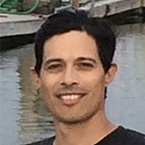AACR-Johnson & Johnson Lung Cancer Innovation Science Grants
These grants represent a joint effort to address the need for promoting and supporting collaborative cancer research to bolster our understanding of how lung cancer can be successfully intercepted. Projects are implemented by multi-institutional teams composed of principal investigators from at least two, but no more than three, different institutions and include a clinical component with an endpoint relevant to improving the detection or treatment of lung cancer.
In 2019, priority was given to projects focused on the use of digital therapeutics and smoking cessation biomarkers/behavioral phenotyping for lung cancer interception.
2019 Grantees

Charles Green, PhD
Associate Professor
University of Texas Health Science Center at Houston
Houston, Texas

Paul M. Cinciripini, PhD
Margaret and Ben Love Chair in Clinical Cancer Care in honor of Dr. Charles A. LeMaistre
University of Texas MD Anderson Cancer Center
Houston, Texas
Research
The team leaders previously demonstrated that electroencephalogram (EEG) assessment of reward sensitivity can be measured using neural responses associated with natural reward or smoking cues. These studies showed that low intrinsic reward sensitivity (IRS-) smokers are less likely to quit smoking than those high with intrinsic reward sensitivity (IRS+) and that varenicline offsets this deficit. Differences in reward sensitivity relate directly to activity in reward centers in the brain (striatum, dLPFC) and are associated with variation in the CHRNA3 rs578776 SNP. In this project, the team is set to extend their previous work by examining genetic correlates of reward sensitivity (IRS+/-) to select markers that previously predicted the IRS construct as well as those related to cessation, withdrawal, and medication response, and then validating this marker set on a prospectively collected sample of smokers.
Acknowledgement of Support
The AACR-Johnson & Johnson Lung Cancer Innovation Science Grant is important to our research program in smoking cessation because it will allow us to leverage nearly 800 existing genetic samples to predict reward sensitivity, validate this marker set on a subsequent prospective sample of smokers, and construct a custom chip that can be used by future scientists to identify the reward sensitivity construct.

Sun S. Kim, PhD
Associate Professor
University of Massachusetts Boston
Boston, Massachusetts

Peter Castaldi, MD, MSc
Assistant Professor
Brigham and Women’s Hospital
Boston, Massachusetts

Mary E. Cooley, PhD, RN, FAAN
Nurse Scientist
Dana-Farber Cancer Institute
Boston, Massachusetts
Research
The primary goal of this study is to leverage digital technology to engage high-risk smokers in an innovative video-phone based smoking cessation program that introduces lung cancer screening as an option to enhance lung health. Efforts are underway to identify high-risk individuals through use of more precise methods such as risk prediction tools and/or genomic analyses to optimize the use of lung cancer screening technology. A secondary goal of this proposal is to gather information about smokers’ perceptions of lung cancer risk, their interest in actual receipt of calculated scores, and then the best way to present this information to enhance understanding.
Acknowledgement of Support
This award will allow our research team to combine our complementary skills to test an innovative intervention that seeks to engage high-risk smokers in behaviors that promote lung health, detect lung cancer sooner, and save more lives.